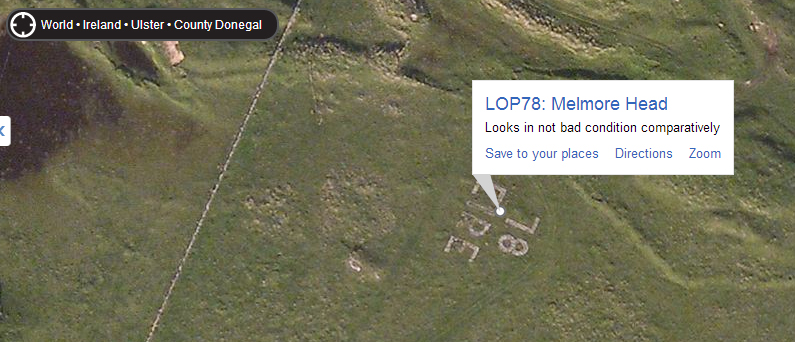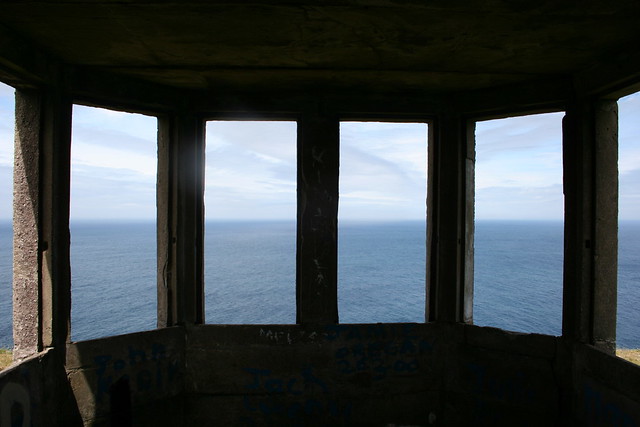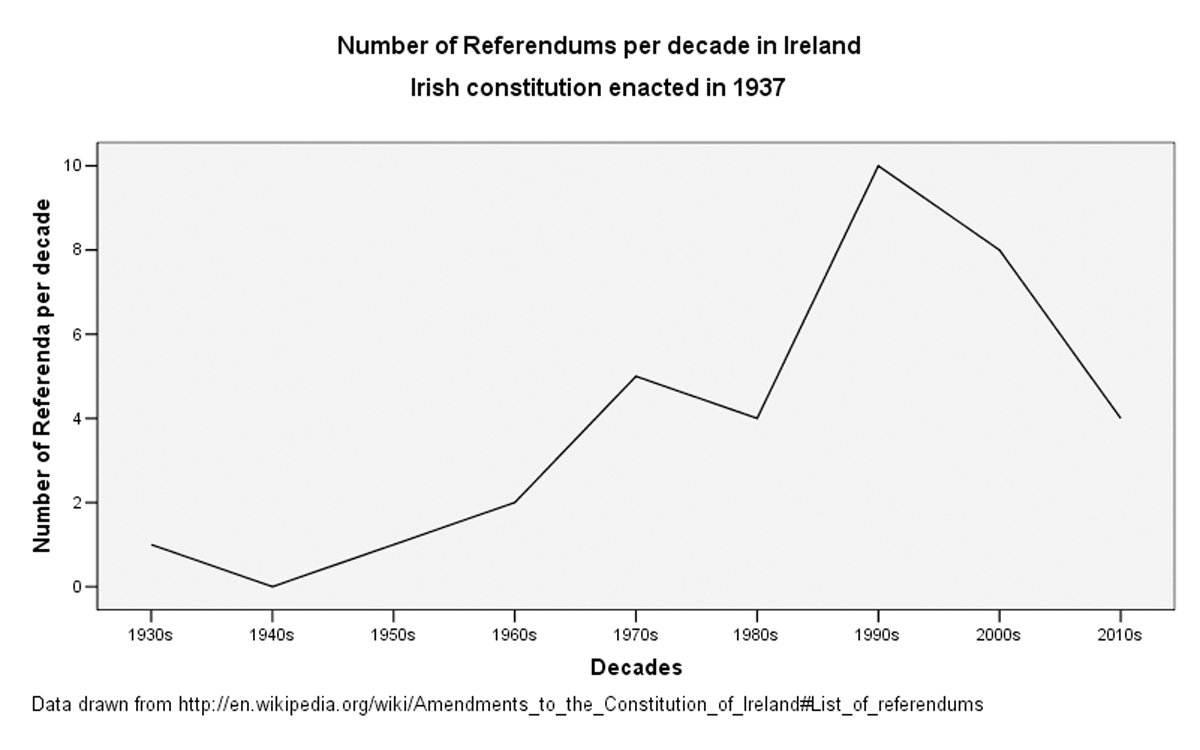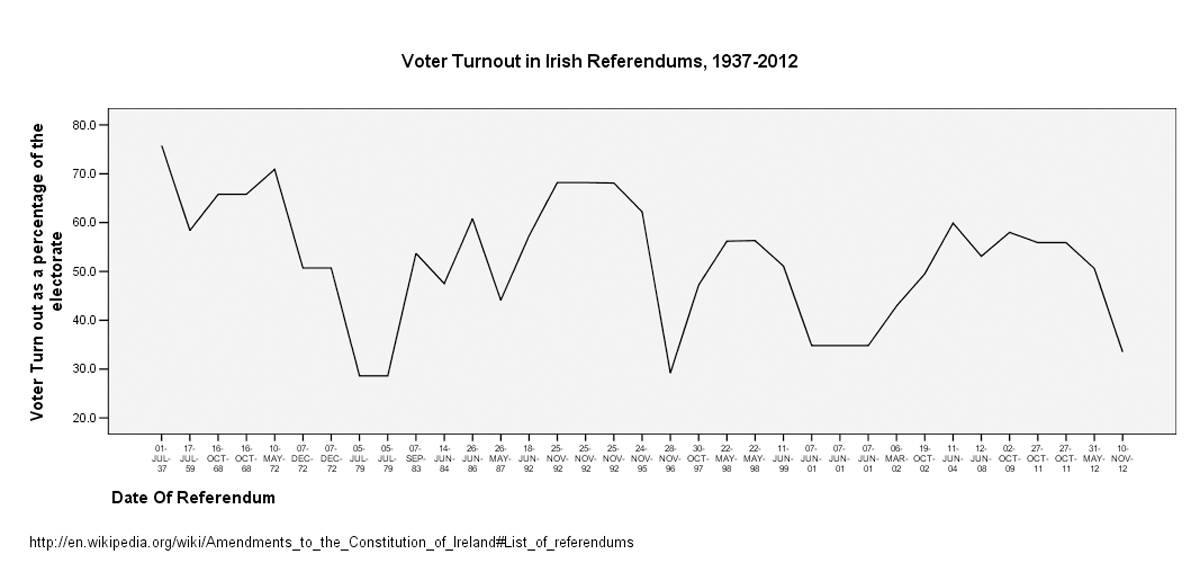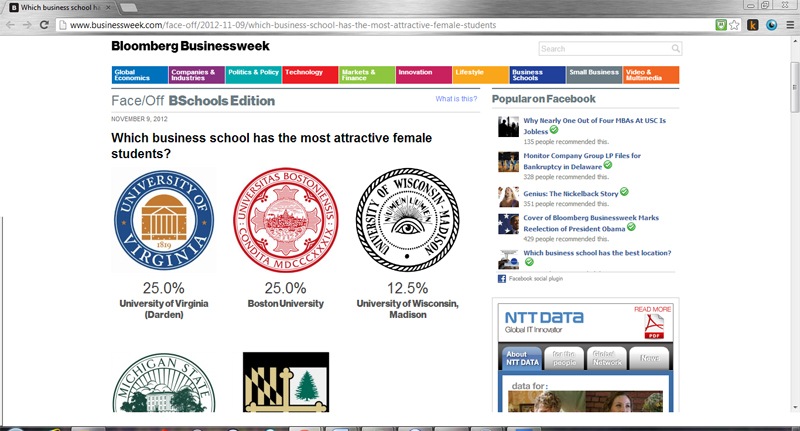The coast of Ireland is peppered with lighthouses, of which the Fastnet is probably the most famous, the teardrop of Ireland. Further to the west, beyond Dursey Island is the lighthouse at Bull Rock. It was built to replace the lighthouse on Calf Rock which was destroyed in a storm just fifteen years after it went into operation. .
Initial plans for a lighthouse in the area were to locate the light on Bull Rock but in the time that elapsed between first considering the matter and actually implementing the construction of a lighthouse, there was a decision made to situate the light on Calf Rock rather than Bull Rock. The lighthouse, I believe, was designed by George Halpin, responsible for a good number of lighthouses designs in Ireland, and following construction, the light was established in 1866. In relative terms, then, it was not a particularly old lighthouse.
The lighthouse was constructed of cast iron and in a storm in 1869 it suffered substantial damage when part of the balcony was swept away. As a result, some reinforcement work was done to protect the new lighthouse. That storm was not without local cost however; six fishermen who went to check on the safety of the lightkeepers drowned on their way home.
I started looking into the history of this lighthouse because the storm of 27 November 1881 is mentioned in the list of storm waves in L O’Brien’s recent paper on extreme wave events in Ireland and I had, in fact, forgotten it ever existed.
We tend to forget how different life is now to life in the late 19th century and it is probably hard to imagine that at the time, night was completely dark, except for the light from the lighthouse. The only light came from candles and the odd oil lamp. Without wanting to think too much about it, it’s pretty likely that the arrival of the lighthouse brought a substantial change to the nightscape at the western end of Dursey Island.
On 27 November 1881, however, it went out. There were six men on the rock, all fortunate enough to be in the base of the lighthouse when the top of the lighthouse was blown off above the reinforced section, and literally just washed away. They got to spend another 12 days on the rock, however, because it was not possible to safely land on the rock. Two British Gunboats attempted and failed the landing; in the event, the men were retrieved by the courage of the attendant boatman, Michael Shea, who lived on Dursey Island who went to retrieve them using a small boat and some of his fishing colleagues from the island. Considerations regarding the rescue were coloured by the loss of six men following storm damage to the lighthouse in 1869. You can find an account of the rescue here on a New Zealand Archive. The rescue also made the newspapers in New York, albeit in some less detail and a similarly short note made the Argus in Melbourne in Australia. Reports suggest that Michael Shea and his colleagues received a reward from the captain of one of the naval vessels attending.
Prior to the rescue, Henry Grissell, who built the lighthouse, wrote an account of the construction of the lighthouse and some comments regarding the suitability of the design of the lighthouse to the Times of London. You can find the text of his letter here (also in the New Zealand archives) at the end of that piece. The construction took 4 years and provided ample evidence of the difficulties of constructing the offshore lighthouses. He gave an account of the expedient efforts they made to relieve construction workers on the rock and provide them with supplies when the boats could not approach. He noted that the lighthouses, 90 foot high sat atop a rock which was 60-90 feet above sea level. The fury of storms sometimes hid the top of the tower for two minutes at a time. He noted that the tower was cast iron lined with brick. He felt that brick was not suitable as it would possibly allow condensation and water get between the inside of the iron and the brickwork, thus causing oxidation.
There is an interview with the head lighthouse keeper here, given to the correspondent of The Standard which syndicated to some of the Australian newspapers (this link goes to the Horsham Times). He notes the substantial rust remaining in the lighthouse and also suggests that it might have been possible to retrieve the men from the rock after 2 days had an approach been made from the other side of the rock.
The wreck of the lighthouse is still to be seen on Calf Rock and its fate was to impact on discussions on the value of cast iron lighthouses whose design was subsequently phased out.
The story appears to have caught the imagination of one of the writers of the Standard, who subsequently endeavoured to reach Dursey Island to give an account of life on the island. It is a fascinating and sobering account of life in West Cork in the 1880s.
At Ballynacallagh I called on Jerry Harrington, one of the three richest men on the island. He came out clad in a tattered flannel shirt, an old hat, a pair of frieze trousers, and a pair of boots which an English beggar would not pick up, half his right foog and half of the toes being exposed as he walked in the heave rain.
….
The little community governs itself and strives, with poor success, to feed itself.
Economically, the island was a basket case. About 200 people lived on it, of which 80 were children, and there were 23 farms. A number of the farmers had a secondary source of food in the fishing and there were twelve households whose sole occupation was fishing, working a total of five boats.
Most of the farming was for grazing with a small bit of planting done for potatoes or sometimes oats.
In 1881-1882, the potato crop was a total failure, and all but one of the fishing boats were knocked to pieces by the recent storm (I assume this is the November 1881 storm which destroyed the lighthouse) and anyway, it had been a bad fishing season too.
The farmers were tenants of Lord Bantry, whose agent, passing through 12 years previously, had substantially increased the rents. But Dursey was not really a cash economy and no one had any actual money. They survived, insofar as they could, on what they could fish or grow, and what credit they could obtain from the shopkeepers in Castletown Berehaven (Castletownbear). The piece described Michael Shea as having a large farm, one sufficient to support four cows. His rent had been increased on the visit of Lord Bantry’s agent from fifteen guineas to seventeen pounds.
Michael Shea also owned a fishing boat and earned income as the tenderman for the lighthouse (I suspect he is the Michael Shea who retrieved the men from Calf Rock at the start of December). In Dursey Island terms at the time, he almost certainly could have been considered well off. But with the lighthouse gone and the fishing poor and substantial rent, he enjoyed at best, a precarious situation and if he was well off by Dursey Island standards, the simple truth was he was not well off at all. He and his family lived on Indian meal and fish, with some buttermilk from time to time. He sold butter to the tradesmen who sold him the Indian meal. He may have earned 6 pounds on the deal but he still owed them forty. In the context of annual rent of seventeen pounds and one stream of income completely gone, this was a substantial debt.
In the early 1880s, apparently every man owned two to three years rent to Lord Bantry, and were afraid of the possibility of evictions to be carried out by Lord Bantry’s agent. The notices were apparently already at the post office at Allihies and so no man would go to collect his post as they could not afford to receive knowledge of their notice. The tradesmen in Castletownbear who traded with the islanders received no cash. On Dursey Island, the scope for paying rent or tax was as good as non-existent.
It is my firm conviction that these poor people would be willing to pay the arrears if they had the means ; but it is clear that they cannot pay in money.
The Standard’s correspondent noted that the people would be willing to pay off their arrears in alternative work (he mentions the construction of a road on the island) if they only had the opportunity.
Following the destruction of the lighthouse on Calf Rock, a temporary lighthouse was established on Dursey and according to Bear Tourism, the remains of the temporary lighthouse can still be seen. In the meantime, a new lighthouse was built on Bull Rock and it was established in 1889, roughly 8 years after the Atlantic had claimed the light on Calf Rock.
________________________________________________________________
Notes.
Most of the contemporaneous reports of the Calf Rock lighthouse destruction came from newspapers in the New Zealand archives (mainly because they are online) with the interview with Thomas Fortune, the head lightkeeper coming from the Australia Archives (Trove). It’s worth noting the delay in the detailed reports – the cablegram reports (three lines) appeared in December; the detailed reports were published around the start of February 1882. The account of life in Dursey Island made the newspapers in New Zealand in March. I loved this comment from one report prior to the rescue of the men on the rock though:
The persons who were on the Calf Rock lighthouse when it was swept away in the late storm and who were saved only by a miracle are still there !
from a report in the Otago Daily Times in February, two months after the men were retrieved from the rock. European news arrived in New Zealand either by cable gram (brief and to the point) or by ship (two to three months after the events in question).
You can access some of the New Zealand archives on this matter here.




